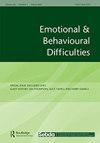A content analysis of school leaders’ conversations about ‘off rolling’ on Twitter and its relevance to teacher education
IF 1.5
Q3 PSYCHOLOGY, EDUCATIONAL
引用次数: 0
Abstract
ABSTRACT This article seeks to illustrate the usefulness to teacher educators of small-scale qualitative social media content analysis by reporting a study of online microblogs (tweets) posted by senior school leaders’ relating to ‘off rolling’ (practices that bypass legal permanent exclusion procedures in English mainstream schools). The outlined method enables analysis of social media content in the absence of costly opinion mining software and its associated affordances and limitations are discussed. The article also outlines the implications of the study’s findings for teacher education. In this instance, it served to illustrate a disparity between different types of professional discourse which future teachers should be prepared to navigate in their teacher training. Given the illegality of ‘off rolling’ and an increasingly incontestable socio-political discourse around inclusive education, it was hypothesised that Twitter affords school leaders a forum for the articulation of views that rest uneasily with this discourse, current legislation and statutory guidance around off rolling. A tendency to discount ‘off rolling’ as a rare occurrence was found despite growing anecdotal evidence that it is viewed as a legitimate, if illegal, practice within some school cultures. This finding is relevant to teacher educators and future teachers who aspire to an inclusive education system.学校领导在Twitter上关于“开动”的对话及其与教师教育的相关性的内容分析
本文旨在通过对高级学校领导发布的与“off rolling”(在英国主流学校绕过法律永久排除程序的做法)有关的在线微博(推文)的研究,说明小规模定性社交媒体内容分析对教师教育工作者的有用性。概述的方法可以在没有昂贵的意见挖掘软件的情况下分析社交媒体内容,并讨论了其相关的功能和局限性。文章还概述了该研究结果对教师教育的影响。在这种情况下,它有助于说明不同类型的专业话语之间的差异,未来的教师应该准备在他们的教师培训中导航。考虑到“罢课”的非法性,以及围绕包容性教育的越来越无可争议的社会政治话语,人们假设Twitter为学校领导人提供了一个论坛,让他们表达与这种话语、当前立法和围绕罢课的法定指导不一致的观点。尽管越来越多的轶事证据表明,在一些学校文化中,这种行为即使是非法的,也被视为一种合法的行为,但人们还是发现了一种将“滚”视为罕见事件的倾向。这一发现与渴望全纳教育系统的教师教育者和未来教师相关。
本文章由计算机程序翻译,如有差异,请以英文原文为准。
求助全文
约1分钟内获得全文
求助全文
来源期刊

EMOTIONAL AND BEHAVIOURAL DIFFICULTIES
PSYCHOLOGY, EDUCATIONAL-
CiteScore
1.80
自引率
10.00%
发文量
10
期刊介绍:
The central intention of Emotional & Behavioural Difficulties (EBDs) is to contribute to readers" understanding of social, emotional and behavioural difficulties, and also their knowledge of appropriate ways of preventing and responding to EBDs, in terms of intervention and policy. The journal aims to cater for a wide audience, in response to the diverse nature of the professionals who work with and for children with EBDs.
 求助内容:
求助内容: 应助结果提醒方式:
应助结果提醒方式:


